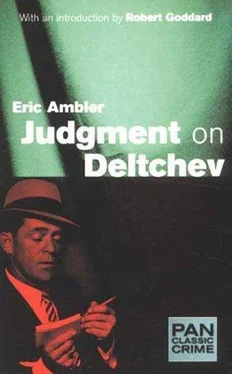Eric Ambler - Judgment on Deltchev
Здесь есть возможность читать онлайн «Eric Ambler - Judgment on Deltchev» весь текст электронной книги совершенно бесплатно (целиком полную версию без сокращений). В некоторых случаях можно слушать аудио, скачать через торрент в формате fb2 и присутствует краткое содержание. Год выпуска: 1977, ISBN: 1977, Издательство: Vintage, Жанр: Криминальный детектив, на английском языке. Описание произведения, (предисловие) а так же отзывы посетителей доступны на портале библиотеки ЛибКат.
- Название:Judgment on Deltchev
- Автор:
- Издательство:Vintage
- Жанр:
- Год:1977
- ISBN:9780307049971
- Рейтинг книги:4 / 5. Голосов: 1
-
Избранное:Добавить в избранное
- Отзывы:
-
Ваша оценка:
- 80
- 1
- 2
- 3
- 4
- 5
Judgment on Deltchev: краткое содержание, описание и аннотация
Предлагаем к чтению аннотацию, описание, краткое содержание или предисловие (зависит от того, что написал сам автор книги «Judgment on Deltchev»). Если вы не нашли необходимую информацию о книге — напишите в комментариях, мы постараемся отыскать её.
Judgment on Deltchev — читать онлайн бесплатно полную книгу (весь текст) целиком
Ниже представлен текст книги, разбитый по страницам. Система сохранения места последней прочитанной страницы, позволяет с удобством читать онлайн бесплатно книгу «Judgment on Deltchev», без необходимости каждый раз заново искать на чём Вы остановились. Поставьте закладку, и сможете в любой момент перейти на страницу, на которой закончили чтение.
Интервал:
Закладка:
‘Stanoiev? I don’t know anyone of that name. Are you sure it was for me?’
He looked stupid. ‘I don’t know, sir. He went away.’
‘I see.’
The lift was deserted. I walked up the wide shallow stairs to the sixth floor.
My room was at the end of a long corridor with upholstered benches set against the wall at intervals along it. As I started down the corridor, I noticed that at the far end there was a man sitting on one of the benches. He was reading a newspaper.
It made an odd picture; one never expects corridor furniture to be used except as shelves for trays and chambermaids’ dusters. As I approached he looked up casually, then went back to his newspaper. I glanced at him as I passed by.
He was a thin, dried-up man with pale, haggard eyes and grey hair cropped so that the bone of his skull was visible. He had a peculiarly blotchy complexion like that of someone just cured of a skin disease. The hands holding up the newspaper were long and yellow. There was a black soft hat beside him on the bench.
I went past him to my room. I put the key in the lock and turned it. Then someone spoke from just behind me.
‘Herr Foster?’
It made me jump. I turned round. The man who had been on the bench was standing there with his hat under his arm.
I nodded.
‘Petlarov,’ he said, and then added in German, ‘I can speak French or German, whichever you prefer.’
‘German will be all right. I’m glad to see you.’ I finished opening the door. ‘Will you come in?’
He bowed slightly. ‘Thank you.’ He walked in and then turned and faced me. ‘I must apologize,’ he said in a clipped, businesslike way, ‘for answering your note in this fashion. A native of this country would not find it strange, but as you are a foreigner I must make an explanation.’
‘Please sit down.’
‘Thank you.’ In the light of the room his clothes were shabby and he looked ill. His precise, formal manner, however, seemed to ignore both facts. He chose a hard chair as if he did not intend to stay long.
‘First,’ he said, ‘I think you should know that I am under surveillance; that is to say, I have to report to the police every day. Second, I am officially listed as an “untrustworthy person”. That means that if you were to be seen entering my house or talking to me in a public place, you would attract the attention of the police, and yourself become suspect. That is why I have used this unconventional means of seeing you. I discovered your room number by leaving a note for you in the name of Stanoiev and noticing which box it was put into. Then I came discreetly up here and waited for you to return. You need therefore have no fear that my name is in any way connected with yours or my presence here known about.’ He bowed curtly.
‘I am most grateful to you for coming.’
‘Thank you. May I ask how you obtained my address?’
‘From a man named Pashik.’
‘Ah, yes. I thought it must be him.’ He looked thoughtfully into space.
‘Do you know him well, Herr Petlarov?’
‘You mean what is my opinion of him?’
‘Yes.’
He considered for a moment. ‘Let us say that I do not subscribe to the common belief that he is merely a disagreeable person whose political views change with the person he talks to. But now that I am here, what do you want of me?’
I had held out my cigarettes. His hand had gone out to them as he was speaking, but now he hesitated. He looked up from the cigarettes, and his eyes met mine.
‘I have some more,’ I said.
He smiled in a deprecatory way. ‘If you had perhaps a bar of chocolate or a biscuit, Herr Foster, it would, I think, be better for my stomach than tobacco.’
‘Of course.’ I went to my suitcase. ‘I have no chocolate, but here are some biscuits.’
I had a box, bought in Paris for the train journey and then forgotten. I opened it. The biscuits were the kind with pink icing sugar on them.
‘Not very good for a bad stomach,’ I remarked.
He took one with a polite smile. ‘Oh yes. Excellent.’ He nibbled at it with very white false teeth.
‘Pashik gave me your piece on Deltchev to read,’ I said.
‘Oh, yes? It was considered unsuitable for publication.’
‘By Pashik?’
‘Yes, but I was not surprised or upset. I knew that it had been commissioned in the belief that because I had had a difference of opinion with Yordan I would therefore write about him in an unfavourable way. If Pashik had asked me, I would have told him what to expect. Fortunately he did not ask.’
‘Fortunately?’
‘If he had known he would not have commissioned the article, and I needed the money.’
‘Oh, I see. I have a bottle of whisky here. Would it be safe to ask the floor waiter for some glasses?’
‘I think not. Perhaps I may have another biscuit.’
‘Of course, please help yourself. You know, Herr Petlarov, I came here to write a series of articles about the trial of Deltchev. But Pashik seems afraid that I shall offend the censor if I do them here.’
‘He is probably right,’ he said calmly. ‘He is usually right about these thing. Yes, I can see. If you offend he will be blamed.’
I must have looked disbelieving. He took another biscuit. ‘I will tell you a little story about the regime. A member of the People’s Party wrote a novel about the fight of a group of workmen with the capitalists who wished to close a factory. It was a naïve story in which the capitalists were all monsters of evil and the workmen’s leader a People’s Party man. The Propaganda Minister, whose name is Brankovitch, would not, however, allow its publication. He said that the hero was not positive.’
‘I don’t understand.’
‘The author had not demonstrated that the hero member of the party was a good man.’
‘But surely that was inferred.’
‘Brankovitch would say that you were in intellectual error, Herr Foster. Inference is not positive. The public must be instructed that the man is good, as they must be instructed in all things.’
‘You must be exaggerating.’
‘In London or New York I would be exaggerating. Here, no. The sequel to this is that the writer was angry and made a little propaganda of his own. He has now been sent to forced labour. Pashik does not see that fate for himself. You see, Herr Foster, those who must be persuaded to obey are no longer important, for shortly we shall cease to exist. Our liquidation has begun.’ He smiled significantly.
‘What do you mean?’
He took another biscuit and held it up. ‘This is the third biscuit I have taken,’ he said. ‘There are twenty-one left in the box. I can eat nine more.’
‘You can have the box.’
He inclined his head. ‘Thank you. I had hoped that you would give it to me. I had based my calculations on your doing so. If I eat nine more I shall have eaten twelve. That will leave twelve for my wife. Luckily we have no children to share with us.’
I was silent.
‘I will explain. It is quite simple. Persons who are listed as untrustworthy are not allowed to work at anything but manual labour. I tried that, but I am not strong enough. So, as I cannot work, my wife and I may not have ration cards. We are, of course, very often hungry, and that can make a good argument for obedience.’
I got up and went to the wardrobe for the whisky. Out of the corner of my eye I saw him reaching for another biscuit. He glanced over his shoulder at me.
‘Please do not distress yourself, Herr Foster. A bad conscience can, I know, be as unpleasant in some ways as an empty stomach, and the person with the biscuits so often has a bad conscience. The trouble is that most of us with empty stomachs also have bad consciences. That combination will prove deadly.’
Читать дальшеИнтервал:
Закладка:
Похожие книги на «Judgment on Deltchev»
Представляем Вашему вниманию похожие книги на «Judgment on Deltchev» списком для выбора. Мы отобрали схожую по названию и смыслу литературу в надежде предоставить читателям больше вариантов отыскать новые, интересные, ещё непрочитанные произведения.
Обсуждение, отзывы о книге «Judgment on Deltchev» и просто собственные мнения читателей. Оставьте ваши комментарии, напишите, что Вы думаете о произведении, его смысле или главных героях. Укажите что конкретно понравилось, а что нет, и почему Вы так считаете.












